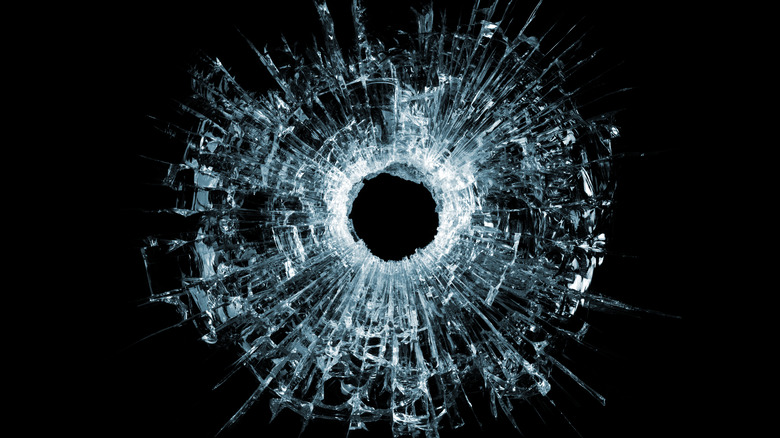Here's What Happens To Your Body When You Die By Gunshot
Tragically, The New York Times reported in 2016, that gun deaths in the United States tallied up to around 27 people each day, or 31 for every one million people. What does it feel like to die from a gunshot? It's a difficult question to answer, as there are myriad factors involved, but a bullet can have a devastating impact on the human body.
According to Science Questions With Surprising Answers, it's the momentum of a bullet that makes it so destructive. Momentum is determined by a combination of mass multiplied by velocity, and guns fire bullets at such outrageous speeds — the maximum speed a bullet reaches is about 1,700 mph, per Future Tech Report – that these small and otherwise harmless objects can cause appalling damage to any target that happens to be in the line of fire.
Naturally, the damage a bullet does to a human body will vary a lot depending on factors such as the type of gun in question, the angle, the area hit, and so on, but the details are truly terrifying. According to a 2014 study from the Journal of the American College of Surgeons (via Newsweek), bullet wounds to the brain are the most dangerous, with a reported survival rate at the time of just 10-15%.
Terrible damage, internally and externally
The awful power of a bullet lies in its ability to penetrate and tear through internal organs. PBS shared the sad story of a 14-year-old boy who sustained a gunshot wound to the abdomen in 2014. One of his lungs, his spleen, diaphragm, pancreas, intestines, and stomach had all been torn through by the shot, causing copious amounts of internal bleeding. Externally, only bruising from the impact and a neat little wound were visible. Bullets can even break bones.
Dr. Bill Smock, Louisville Metro Police Surgeon, reports (per PBS) that smaller firearms can damage the surrounding tissue of organs, for about 3/4 of an inch around the impact are of the bullet itself. With a larger gun like an assault rifle, according to Smock, this damage extends up to around 4 inches from the point the bullet penetrated.
Dr. Agnibho Mondal, of Kolkata's School of Tropical Medicine, writes on his blog that exit wounds (where the bullet penetrates the body entirely and exits) tend to bleed even more and be larger than the wound caused where the bullet entered.

